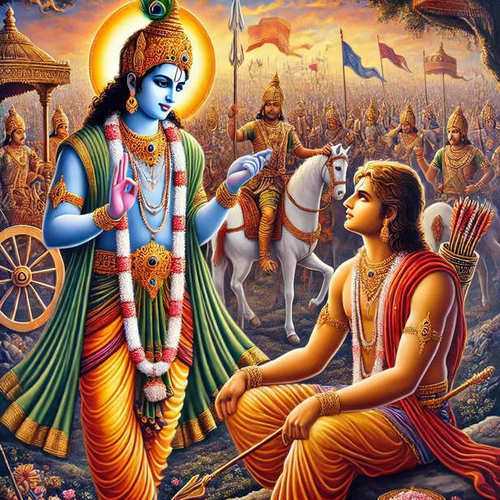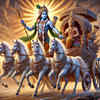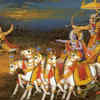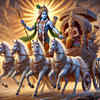
Ownership and identity have long been intertwined in human life. We define ourselves by what we possess—wealth, relationships, achievements, and even ideologies. But the Bhagavad Gita, a timeless philosophical guide, challenges this notion of ownership. It reveals a deeper truth: what we perceive as "ours" is borrowed from the world, temporary, and destined to return to its source. The ego's grip on ownership binds us to a cycle of suffering, and only by letting go can we achieve true freedom.
The Illusion of Ownership

In life, we often declare, “This is mine,” whether it’s our possessions, relationships, or accomplishments. However, the Gita reminds us that such attachments stem from ignorance. In
Chapter 2, Verse 13, Krishna explains the transient nature of life:
देहिनोऽस्मिन्यथा देहे कौमारं यौवनं जरा।
तथा देहान्तरप्राप्तिर्धीरस्तत्र न मुह्यति।।
Translation:
"Just as the soul passes, in this body, from childhood to youth to old age, it similarly passes into another body at death. The wise are not bewildered by such a change."
This verse teaches us that life is in constant flux. What we own—our possessions, relationships, and even our physical body—is temporary. Our sense of ownership is an illusion, as all things eventually slip through our grasp.
The Ego’s Trap

Ownership feeds the ego, convincing us that we control the world around us. The Gita exposes this fallacy in
Chapter 3, Verse 27:
प्रकृतेः क्रियमाणानि गुणैः कर्माणि सर्वशः।
अहङ्कारविमूढात्मा कर्ताहमिति मन्यते।।
Translation:
"All activities are performed by the modes of material nature, but the deluded ego thinks, ‘I am the doer.’"
When we identify with our possessions or achievements, we falsely believe we are their creators and masters. This delusion not only inflates our ego but also leads to anxiety, as we fear losing what we claim to own.
Everything Is Borrowed

The Gita teaches that nothing truly belongs to us. Our material wealth comes from nature’s resources, our knowledge stems from what others have shared, and even our bodies rely on the elements of the Earth. Krishna emphasizes this in
Chapter 5, Verse 29:
भोक्तारं यज्ञतपसां सर्वलोकमहेश्वरम्।
सुहृदं सर्वभूतानां ज्ञात्वा मां शान्तिमृच्छति।।
Translation:
"Knowing Me to be the ultimate beneficiary of all sacrifices and austerities, the Supreme Lord of all worlds, and the benefactor of all living beings, one attains peace."
By recognizing that everything belongs to the Supreme and is only entrusted to us temporarily, we can free ourselves from the illusion of ownership.
The Burden of Possession

Owning something is not just a privilege—it’s a responsibility that often turns into a burden. The need to protect and multiply possessions can breed fear, pride, and envy. These emotions keep us entangled in the material world, distancing us from spiritual growth.
Krishna advises Arjuna in
Chapter 2, Verse 47:
कर्मण्येवाधिकारस्ते मा फलेषु कदाचन।
मा कर्मफलहेतुर्भूर्मा ते सङ्गोऽस्त्वकर्मणि।।
Translation:
"You have a right to perform your prescribed duties, but you are not entitled to the fruits of your actions. Never consider yourself to be the cause of the results of your activities, nor be attached to inaction."
This teaching liberates us from the endless cycle of expectation and disappointment. When we detach from the results of our efforts, we lighten the burden of possession.
Ownership and the Ego

The ego thrives on the illusion of control. It convinces us that we can shape our destiny through material acquisitions and achievements. However, the Gita reminds us that surrendering this false sense of control leads to liberation.
In
Chapter 18, Verse 66, Krishna says:
सर्वधर्मान्परित्यज्य मामेकं शरणं व्रज।
अहं त्वां सर्वपापेभ्यो मोक्षयिष्यामि मा शुचः।।
Translation:
"Abandon all varieties of dharma and surrender unto Me alone. I shall deliver you from all sinful reactions; do not fear."
Surrendering here does not mean abandoning responsibilities; it means letting go of the ego-driven need to control outcomes.
True Ownership Lies in the Soul

What, then, can we truly call our own? The Gita teaches that only the soul—the eternal essence within us—is truly ours. Unlike material possessions, the soul is indestructible, unchanging, and eternal. In
Chapter 2, Verse 20, Krishna describes the soul’s immortality:
न जायते म्रियते वा कदाचिन्
नायं भूत्वा भविता वा न भूयः।
अजो नित्यः शाश्वतोऽयं पुराणो
न हन्यते हन्यमाने शरीरे।।
Translation:
"For the soul, there is neither birth nor death at any time. The soul has not come into being, does not come into being, and will not come into being. It is unborn, eternal, ever-existing, and primeval. It is not slain when the body is slain."
Recognizing the soul as our true essence shifts our focus from material possessions to spiritual growth, which is the only "ownership" of lasting value.
Living Without AttachmentThe Gita encourages us to live in the world but not be controlled by it. This principle, known as detachment, allows us to fulfill our responsibilities without being ensnared by material desires. Krishna’s teachings guide us to act with purpose and sincerity while letting go of ego and pride.
The Bhagavad Gita’s wisdom challenges us to reconsider our relationship with ownership. "What you own ends up owning you" is not just a cautionary phrase but a spiritual truth. By releasing our attachments, recognizing the impermanence of all things, and focusing on the eternal nature of the soul, we free ourselves from the bondage of materialism.
Ultimately, the Gita reminds us that nothing is truly ours. All that we claim to own is borrowed from the world, entrusted to us for a fleeting moment, and destined to return to its source. True freedom lies in understanding this eternal truth and embracing a life of humility, gratitude, and detachment.
 Ownership and identity have long been intertwined in human life. We define ourselves by what we possess—wealth, relationships, achievements, and even ideologies. But the Bhagavad Gita, a timeless philosophical guide, challenges this notion of ownership. It reveals a deeper truth: what we perceive as "ours" is borrowed from the world, temporary, and destined to return to its source. The ego's grip on ownership binds us to a cycle of suffering, and only by letting go can we achieve true freedom.
Ownership and identity have long been intertwined in human life. We define ourselves by what we possess—wealth, relationships, achievements, and even ideologies. But the Bhagavad Gita, a timeless philosophical guide, challenges this notion of ownership. It reveals a deeper truth: what we perceive as "ours" is borrowed from the world, temporary, and destined to return to its source. The ego's grip on ownership binds us to a cycle of suffering, and only by letting go can we achieve true freedom.
 In life, we often declare, “This is mine,” whether it’s our possessions, relationships, or accomplishments. However, the Gita reminds us that such attachments stem from ignorance. In
Chapter 2, Verse 13, Krishna explains the transient nature of life:
In life, we often declare, “This is mine,” whether it’s our possessions, relationships, or accomplishments. However, the Gita reminds us that such attachments stem from ignorance. In
Chapter 2, Verse 13, Krishna explains the transient nature of life:
 Ownership feeds the ego, convincing us that we control the world around us. The Gita exposes this fallacy in
Chapter 3, Verse 27:
Ownership feeds the ego, convincing us that we control the world around us. The Gita exposes this fallacy in
Chapter 3, Verse 27:
 The Gita teaches that nothing truly belongs to us. Our material wealth comes from nature’s resources, our knowledge stems from what others have shared, and even our bodies rely on the elements of the Earth. Krishna emphasizes this in
Chapter 5, Verse 29:
The Gita teaches that nothing truly belongs to us. Our material wealth comes from nature’s resources, our knowledge stems from what others have shared, and even our bodies rely on the elements of the Earth. Krishna emphasizes this in
Chapter 5, Verse 29:
 Owning something is not just a privilege—it’s a responsibility that often turns into a burden. The need to protect and multiply possessions can breed fear, pride, and envy. These emotions keep us entangled in the material world, distancing us from spiritual growth.
Owning something is not just a privilege—it’s a responsibility that often turns into a burden. The need to protect and multiply possessions can breed fear, pride, and envy. These emotions keep us entangled in the material world, distancing us from spiritual growth.
 The ego thrives on the illusion of control. It convinces us that we can shape our destiny through material acquisitions and achievements. However, the Gita reminds us that surrendering this false sense of control leads to liberation.
The ego thrives on the illusion of control. It convinces us that we can shape our destiny through material acquisitions and achievements. However, the Gita reminds us that surrendering this false sense of control leads to liberation.
 What, then, can we truly call our own? The Gita teaches that only the soul—the eternal essence within us—is truly ours. Unlike material possessions, the soul is indestructible, unchanging, and eternal. In
Chapter 2, Verse 20, Krishna describes the soul’s immortality:
What, then, can we truly call our own? The Gita teaches that only the soul—the eternal essence within us—is truly ours. Unlike material possessions, the soul is indestructible, unchanging, and eternal. In
Chapter 2, Verse 20, Krishna describes the soul’s immortality: